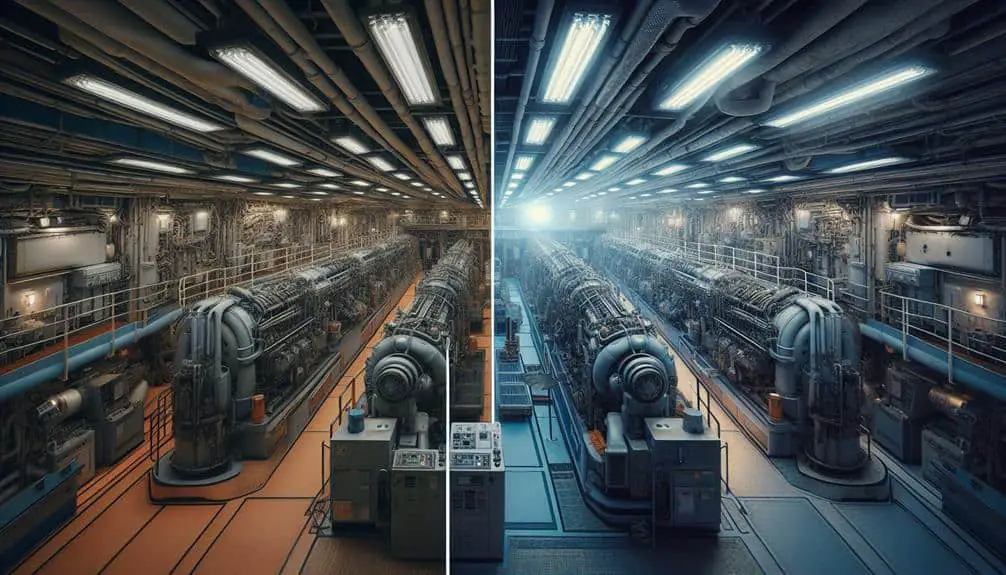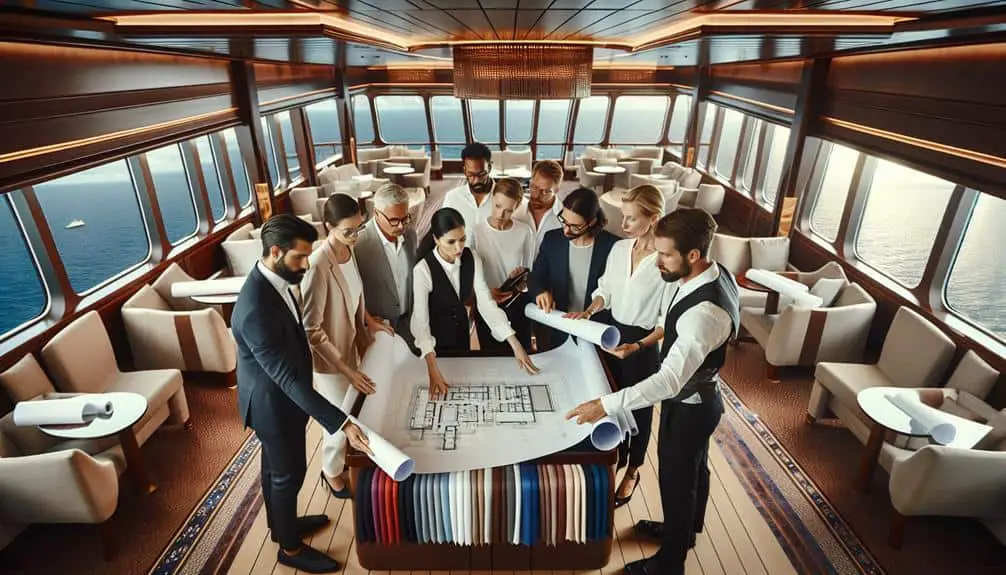To enhance efficiency, upgrade cruise ship engine rooms for optimized fuel consumption and emissions reduction. Advanced monitoring systems allow real-time adjustments for fuel savings. Ensure safety by implementing robust protocols, upgrading ventilation, and installing fire suppression tech. Boost environmental sustainability with eco-friendly propulsion systems and exhaust gas cleaning. Improve performance with modern fuel injection, propulsion upgrades, and predictive maintenance systems. Integrate technology seamlessly for efficiency and reliability enhancements. Renovating engine rooms is essential for maximizing cruise ship operations across energy, safety, sustainability, performance, and technology. Learn more about these critical upgrades to guarantee excellent performance.
Key Points
- Enhance energy efficiency and reduce fuel consumption for cost savings.
- Improve safety measures to prevent hazards like fires and poor air quality.
- Ensure environmental sustainability by minimizing emissions and pollution.
- Enhance performance and reliability through modern propulsion and monitoring systems.
- Integrate advanced technologies for efficiency, predictive maintenance, and remote monitoring.
Increased Energy Efficiency
To enhance the overall energy efficiency of cruise ship engine rooms, prioritize the optimization of fuel consumption through advanced monitoring systems. By implementing cutting-edge technology, such as real-time fuel monitoring and performance analytics, cruise ship operators can achieve notable reductions in fuel consumption, leading to decreased emissions and substantial fuel savings. These advanced monitoring systems enable engineers to closely track fuel usage, identify inefficiencies, and make real-time adjustments to maximize the ship's energy efficiency.
Reduced emissions are an important benefit of optimizing fuel consumption in cruise ship engine rooms. By burning less fuel, ships can notably decrease their environmental impact by emitting fewer pollutants into the atmosphere. This reduction in emissions not only benefits the environment but also enhances the overall sustainability of the cruise industry.
Furthermore, fuel savings resulting from improved fuel consumption optimization can lead to substantial cost reductions for cruise ship operators. By utilizing advanced monitoring systems to achieve greater energy efficiency, operators can lower their fuel expenses, ultimately improving the profitability of their operations.
Enhanced Safety Measures
Implementing robust safety protocols in cruise ship engine rooms is essential to guarantee the well-being of passengers and crew members during voyages. Upgraded ventilation systems are a key component of enhanced safety measures. These systems not only enhance air quality but also help prevent the buildup of hazardous fumes or gases that could pose a threat to individuals onboard. By enhancing ventilation, the risk of potential health issues due to poor air circulation is greatly reduced.
Additionally, advanced fire suppression technology plays a critical role in increasing safety standards. Installing cutting-edge fire suppression systems can swiftly detect and extinguish fires before they escalate, minimizing the risk of significant damage or harm. These systems are designed to react quickly and effectively in the event of a fire emergency, providing passengers and crew members with an added layer of protection.
Improved Environmental Sustainability
Enhancing cruise ship engine rooms' environmental sustainability involves optimizing energy efficiency through advanced propulsion systems and eco-friendly technologies. By implementing these upgrades, cruise ships can achieve significant reductions in emissions and fuel savings.
One key aspect of improving environmental sustainability is the adoption of more efficient propulsion systems. Advanced engines, such as LNG-powered engines or hybrid systems, can greatly reduce emissions compared to traditional diesel engines. These systems not only lower harmful pollutants but also contribute to substantial fuel savings over time.
Furthermore, the integration of eco-friendly technologies like exhaust gas cleaning systems and waste heat recovery systems plays an essential role in enhancing sustainability. Exhaust gas cleaning systems help minimize air pollution by removing harmful substances from emissions. Waste heat recovery systems capture and reuse excess heat from the engine, improving overall energy efficiency and reducing fuel consumption.
Enhanced Performance and Reliability
Upgrading engine room components with cutting-edge technology can greatly boost cruise ship performance and reliability. When it comes to enhancing performance and reliability in cruise ship engine rooms, consider the following:
- Performance Optimization: Implementing advanced fuel injection systems and turbochargers can markedly increase engine efficiency, leading to higher power output and improved speed capabilities. Upgrading to modern propulsion systems can also enhance maneuverability and responsiveness, optimizing the ship's overall performance.
- Reliability Enhancement: Installing state-of-the-art monitoring and predictive maintenance systems allows for real-time tracking of engine parameters and early detection of potential issues. Upgrading to more durable materials and components can increase the lifespan of critical engine parts, reducing the risk of unexpected failures and downtime. Additionally, integrating redundant systems and backup mechanisms ensures operational continuity even in challenging conditions.
- Efficiency Improvement: Employing energy recovery systems and optimizing power distribution networks can minimize energy wastage and reduce fuel consumption. Upgrading to eco-friendly technologies not only enhances the ship's environmental sustainability but also contributes to long-term cost savings and operational efficiency.
Modernization and Technology Integration
Consider the seamless integration of modern technologies into cruise ship engine rooms to propel efficiency and performance to new heights.
The benefits of technology integration during the renovation process are manifold. By incorporating advanced automation systems, such as predictive maintenance software and real-time monitoring sensors, cruise ships can optimize fuel consumption, reduce downtime, and enhance overall operational reliability. Integration of state-of-the-art propulsion systems, like azimuth thrusters and podded propulsion, not only increases maneuverability but also boosts energy efficiency.
Moreover, modernization allows for the adoption of eco-friendly solutions like exhaust gas cleaning systems and waste heat recovery units, reducing environmental impact. Through the renovation process, the integration of digital control systems and remote diagnostics enables engineers to monitor engine performance remotely, swiftly identify issues, and implement timely solutions.
Frequently Asked Questions
How Much Does It Typically Cost to Renovate a Cruise Ship's Engine Room?
To renovate a cruise ship's engine room, the cost estimation typically ranges from $1 million to $3 million, depending on the extent of upgrades needed. The renovation timeline can last between 6 to 12 months, ensuring peak functionality and safety.
What Are Some Common Challenges Faced During the Renovation Process of a Cruise Ship's Engine Room?
During the renovation process of a cruise ship's engine room, challenges are plentiful. From cramped spaces hindering access to outdated equipment requiring upgrades, each step demands precision and expertise to guarantee seamless operations.
Are There Any Specific Regulations or Standards That Need to Be Followed During the Renovation of a Cruise Ship's Engine Room?
To renovate cruise ship engine rooms, regulations compliance is essential. Safety measures must align with maritime standards to guarantee passenger and crew safety. Adherence to strict guidelines for equipment upgrades and structural modifications is imperative.
How Often Do Cruise Ship Engine Rooms Need to Be Renovated?
You should consider renovating cruise ship engine rooms periodically to align with maintenance schedules. Upgrades enhance efficiency, incorporate technological advancements, and reduce environmental impact. Regular renovations guarantee top-notch performance and compliance with evolving industry standards.
What Are Some Key Factors to Consider When Choosing a Contractor for Renovating a Cruise Ship's Engine Room?
When choosing a contractor for renovating a cruise ship's engine room, you are a captain selecting a skilled crew. Focus on expertise, reputation, and adherence to project timeline. Precision is paramount for smooth sailing.



